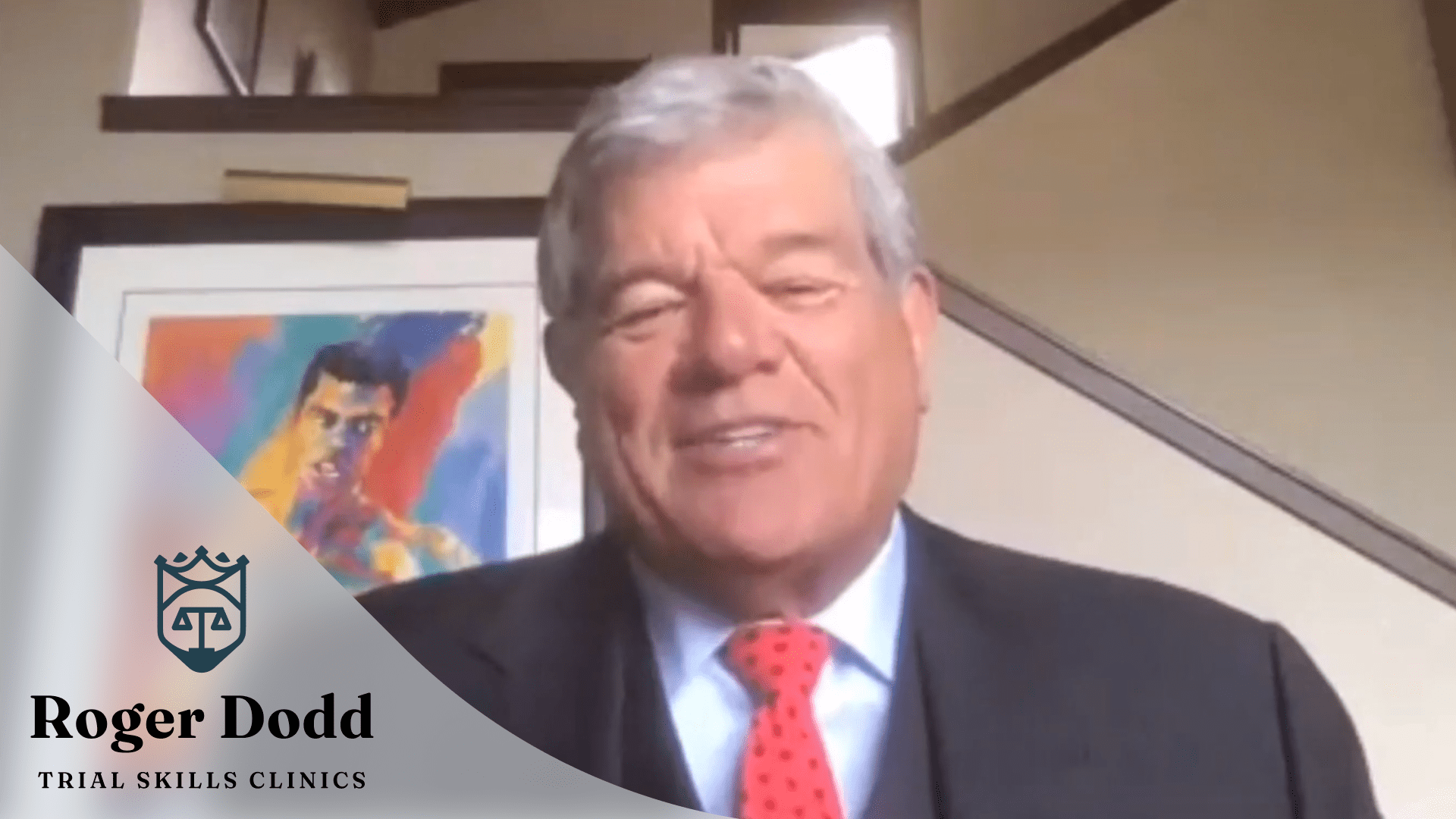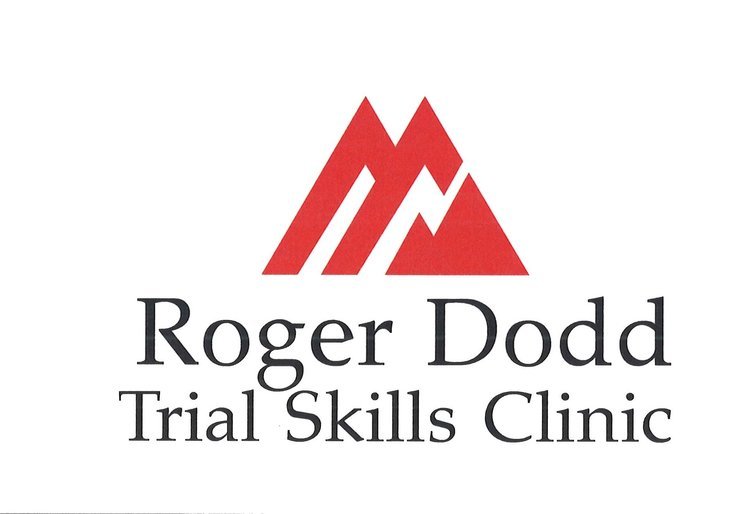Online Videos
In this series, which contains four 90-minute videos, Roger J. Dodd presents a
cross-examination system through easily learned, solid principles. In each video Roger
illustrates key principles and techniques of cross-examination in three venues: trial, in-
person depositions or online depositions. The examples are based on real-life
examples. You will immediately be able to put to use important cross examination skills
that Roger shares from even just one video. You will learn the following principles in
each section:
Section 2
Word Selection
Chapters
How to Deal with Objections
Page Preparation
In this series, which contains four 90-minute videos, Roger J. Dodd presents a
cross-examination system through easily learned, solid principles. In each video Roger
illustrates key principles and techniques of cross-examination in three venues: trial, in-
person depositions or online depositions. The examples are based on real-life
examples. You will immediately be able to put to use important cross examination skills
that Roger shares from even just one video. You will learn the following principles in
each section:
Section 3
Loops
Double Loops
Spontaneous Loops
Sequences
In this series, which contains four 90-minute videos, Roger J. Dodd presents a
cross-examination system through easily learned, solid principles. In each video Roger
illustrates key principles and techniques of cross-examination in three venues: trial, in-
person depositions or online depositions. The examples are based on real-life
examples. You will immediately be able to put to use important cross examination skills
that Roger shares from even just one video. You will learn the following principles in
each section:
Section 4
The ‘I don’t know’ Witness
Trilogies
21 Techniques to Control the Difficult Witness in All Three Venues
Whether you are a trial veteran or novice, this cross-examination seminar teaches you how to create, sequence and use chapters for maximum impact. Learn specific techniques to control the witness and use documents and facts to close doors to make their witness agree with you. The presenters use examples from video depositions to teach and reinforce ideas and show the tools in action. tips for organizing questions, sourcing documents and practicing for trial in depositions is taught. You are sure to get nuggets from this class that you can immediately put to use. It is not about personality. It is about preparation. This class walks you through and show you how to get what you want from the witness using techniques you can do.
Using trial and deposition examples, we cover how to constructively prove our case out of the opposing party and their experts on cross-examination. It starts with depositions that don’t ‘discover’ but seek and obtain verbal requests for admissions. We then force opponents to choose not to call their witnesses and our witnesses are unchallenged or they call the witnesses knowing we already have the ammunition.
Keith and Roger point out key principles and steps for a winning cross; why active listening is essential; how to always maintain the high ground, even when things don’t go as planned; how to handle evasive witnesses; how to size up the witness; how to use sequencing, tone, and body language, which are as important as the words you use; how to be flexible; how to stay in control; how to start cross in opening; how to give yourself some peace of mind and calm your nerves. This is just the tip of the iceberg. The one-two punch of Mitnik and Dodd is a one of a kind cross-examination extravaganza.
The case involved a motorcycle versus utility truck collision. The parties ultimately stipulated to a bench trial before a judge in Los Angeles County Superior Court. But before that, the case was set for a jury trial in the spring of 2020. To prepare for that trial, Steve’s lawyers at Panish Shea & Boyle worked with Sonia Chopra to focus group the case. The case was eventually tried before a judge in a bench trial in February of 2021 and resulted in a $23.7 million bench award.
The focus of this program is Adam M. Slater’s cross-examination of lead defense expert Dr. Debra Fromer, a urogynecologist from Hackensack, New Jersey, the same town where the case was tried. Dr. Fromer testified on direct that the Prolift was not defective, that the warnings were accurate, and that the cause of the plaintiff’s condition was not the Prolift. Also notable, before Dr. Fromer testified the defense team told the Judge that Dr. Fromer would provide the key testimony to establish the applicability of the state of the art defense, which is an absolute defense to liability if proven under New Jersey law (in other states, state of the art is a risk-utility factor and not an absolute defense). As a result of the cross-examination, the Court declined to charge state of the art.
Joe Fried & Roger Dodd share the lessons that they have learned, from basic to advanced, about cross-examination. Through lecture, discussion, and video examples, they cover their best thoughts and practices for preparation and execution of cross-examinations in discovery depositions, depositions for use at trial, and live at trial.
Roger Dodd is breaking down Rex's cross- examination of Dr. Bigelow, a Bariatric Expert, who had only 24 hours to prepare. Roger is also coaching Khail on his cross-examination of an Economist, Jennie McNulty. Hosted by Sean Claggett.
Roger Dodd breaks down and critiques Sean Claggett’s cross- examination of Dr. Amos. This cross-examination was recorded by CVN. Sean gets in the weeds with Amos on the Folstein Mini Mental Exam to discredit him, his administration of the exam, and his conclusions.
Roger Dodd breaks down and critiques Sean Claggett’s cross-examination of Dr. Goodman, a cardiologist, and Dr. Amos, a neuropsychologist in this hypoxic TBI trial. You will see Sean in action cross examining expert witnesses at a recent trial that was on CVN. Roger is coaching Sean on how to improve his cross-examination structure and delivery. This is a great opportunity to watch Sean and Roger working together so we all can improve on our skills.
Watch Roger Dodd break down Spencer Lucas’ cross-examination of defenses expert economist Margo Ogus, Ph.D. Learn the methodology of an effective examination of an expert economist which can be used in virtually any case. See how expose inaccuracies in the defense’s economic analysis and turn this sometimes, mundane material into a powerful cross.
Lloyd Bell shows why he has success in medical malpractice trials. He brings Dodd’s treatise, Cross-Examination: Science and Technique, to life as he methodically destroys the credibility of Dr. Walsh and tells the medical story of his partner's neglect.
Brian Panish Cross examines physiatrist Dr. Bradshaw and the bruising blood bath continues. Roger Dodd, Rex Parris, and Spencer Lucas explain the methodology and preparation.
Brian Panish breaks down his cross-examinations of two top defense experts that ultimately resulted in the jury awarding the Plaintiff, Maria Francisco, more than $15.3 million for her back injury. You will see the video footage from Courtroom View Network of Panish doing what he does best-crush defense experts in cross. The first defense expert analyzed is Clement Jones M.D., a highly-regarded spine surgeon in the Bay Area. Jones tried to outwit Panish with his credentials only to get flat out impeached. The second defense expert is David Bradshaw M.D. (physical medicine and rehabilitation). See Panish’s tried and true techniques of cross exam that have brought down the most seasoned defense experts in the business.
Brian Panish continues his crushing cross examination of Dr. Clemente Jones. Brian impeaches him on his cannons of ethics for expert witnesses, reframes LOPs as a kind Dr providing often pro bono treatment, impeaches on his lack of experience with burst fractures, impeaches repeatedly on the medicine. Roger Dodd, who wrote Cross- Examination: Science and Techniques, Rex Parris and Spencer Lucas cohost.
Roger Dodd and Joseph Low review Cross-Examining the Investigating Officer.
In this presentation, Edward and Jessica will talk about:
Resilience – How to fight a case and win when none of your experts will support you and believing in your ability to change cases based on targeted preparation.
Deconstructing a circumstantial forensic case – Fact management/argument structuring.
Compelling cross-examination strategies.
Becoming your own expert – Utilizing the scholastic internet, classic texts, and open-source material to undermine the witness testimony.
Driving the narrative – making sure your theory is constantly reinforced, signposted repeatedly, and so it ultimately prevails.
The power of taking your time – accentuation and emphasis.
The use of metaphor and allegory.

This includes—
Cross By Camera
To litigate in the COVID-19 era you need more than the traditional cross-examination techniques you’ve always relied on. COVID-19 has dramatically changed the face of litigation...kick-starting a technology shift in the practice of law that has already taken place in almost every other area of society.
Zoom, Webex, and other remote platforms are now a regular part of the litigation and pre-litigation process and will remain so, long after the COVID crisis ends.
Judges in courts at every level across the U.S., Canada, and the UK have embraced these platforms for remote depositions, mediations, and non-jury trials, saying that remote is so efficient and saves so much in costs that it will be permanent.

![[Section Two] CROSS-EXAMINATION IN THREE VENUES: TRIALS, IN-PERSON DEPOSITIONS, AND ONLINE DEPOSITIONS (A FOUR-PART SERIES)](https://images.squarespace-cdn.com/content/v1/60148b6bd3f4257107c23d75/1619880586555-63E9YY38JHSN5VMZ4KD9/thumbyCE.png)
![[Section Three] CROSS-EXAMINATION IN THREE VENUES: TRIALS, IN-PERSON DEPOSITIONS, AND ONLINE DEPOSITIONS (A FOUR-PART SERIES)](https://images.squarespace-cdn.com/content/v1/60148b6bd3f4257107c23d75/1619880104575-YN6VM6R98P0N7K2YJ2F5/thumbyCE.png)
![[Section Four] CROSS-EXAMINATION IN THREE VENUES: TRIALS, IN-PERSON DEPOSITIONS, AND ONLINE DEPOSITIONS (A FOUR-PART SERIES)](https://images.squarespace-cdn.com/content/v1/60148b6bd3f4257107c23d75/1619879674072-XZ4Y4F4UN8DMPAYQG58T/thumbyCE.png)

















In this series, which contains four 90-minute videos, Roger J. Dodd presents a
cross-examination system through easily learned, solid principles. In each video Roger
illustrates key principles and techniques of cross-examination in three venues: trial, in-
person depositions or online depositions. The examples are based on real-life
examples. You will immediately be able to put to use important cross examination skills
that Roger shares from even just one video. You will learn the following principles in
each section:
Section 1
Over-Arching Principles of Cross-Examination
Philosophy of Cross-Examination
Destructive Cross-Examination
Constructive Cross-Examination
The Only Three Rules of Cross-Examination